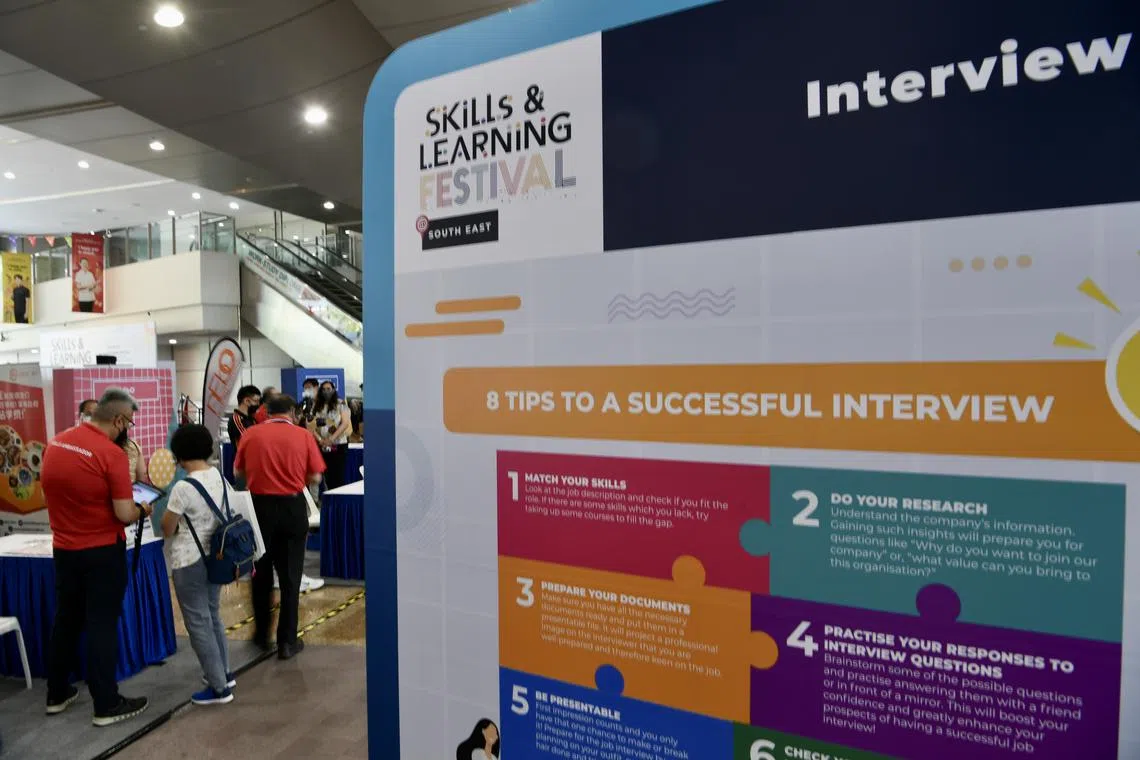Surge in demand for green, digital, care skills in Singapore in last 4 years: SkillsFuture report
Sign up now: Get tips on how to help your child succeed

Digital skills will soon be required in most if not all industries and jobs, accounting for the growth in demand captured by the report.
ST PHOTO: DESMOND FOO
SINGAPORE - Demand for workers with skills in the digital, green and caregiving spheres has surged over the last four years, the latest report by SkillsFuture Singapore has found.
Demand for skills in green facilities management has grown by 23 times, while demand for sustainable investment management has increased by 15.5 times, the report released on Tuesday said.
Similarly, demand for skills such as software testing and user experience design has grown – doubling or nearly doubling over the same time period – the report said, alongside demand for caretaking skills such as professional consultation and family engagement.
The report was launched by Education Minister Chan Chun Sing at the SkillsFuture Fellowships and Employer Awards held at the Sands Expo and Convention Centre.
Mr Chan said the report indicates growth opportunities and seeks to direct people to the relevant training programmes and funding.
The Skills Demand for the Future Economy Report is the second such report released by SkillsFuture Singapore, and details the skills in demand across the Republic’s economy.
It identifies skills in three main areas – the digital, green and care economies – and works out demand by compiling job postings by employers in Singapore and comparing the numbers between 2018 and 2022.
The report also details the rate at which demand for each skill has increased, as well as job roles that use these skills and where to learn them.
There is also a section on mid-career workers and how to help them upgrade or acquire new skills as the economy evolves.
Ms Melissa Low, research fellow at the National University of Singapore’s Centre for Nature-based Climate Solutions, said the recognition that climate change is a global emergency is a primary driver of this growing demand for “green economy” skills.
She added that Singapore’s ambition to become a carbon services hub has also resulted in an increase in carbon service companies setting up a presence here, further boosting demand.
Ms Low added that “green skills” such as carbon footprinting, accounting and management are not new and cut across sectors.
Professor of Communication and Technology at the Singapore University of Technology and Design Lim Sun Sun said the Covid-19 pandemic accelerated digitalisation across industries which might have otherwise been slower to move.
These include building and construction, agriculture and even the lifestyle sector, she said.
This means that digital skills are required or will soon be required in most if not all industries and jobs, accounting for the growth in demand captured by the report.
SkillsFuture Singapore, in a statement, also said that from Jan 1, 2023, Singaporeans can undergo specialised training to acquire skills in the digital, green and care industries, through a refreshed series of SkillsFuture courses.
Prof Lim said Singapore’s economy is heavily focused on services, and the country has been working towards digitalisation through policy and infrastructure for some time, even before the pandemic.
She said: “Post-pandemic, demand for these skills may not continue to grow as fast, but the trend is here to stay… even in traditional job roles like marketing, which have been around for decades. People and industries must prepare (for it).
“Like it or not, the fact that Singapore has manpower constraints means that every industry will look to digitalisation for efficiencies.”
Prof Lim added that the new report is instructive for people as it maps out the sectors where digitalisation has occurred as well as the digital skills that are in high demand and highly transferable between job roles.
She said: “The information from the report could help you make a choice – you should use it judiciously and should choose skills which map against your own strengths, interests and background.”
Ms Low said that Singaporeans curious about new jobs in the green economy should also read up on Singapore’s sustainability journey to understand the circumstances that have led the country to prioritise sustainability in its planning and economy.
She said: “Singaporeans can tap this growth, with those with the relevant skills offering them to those who need them, whether through mentorship or developing or designing training programmes. NUS is developing such training as we are seeing a growth in demand for such skills.”



